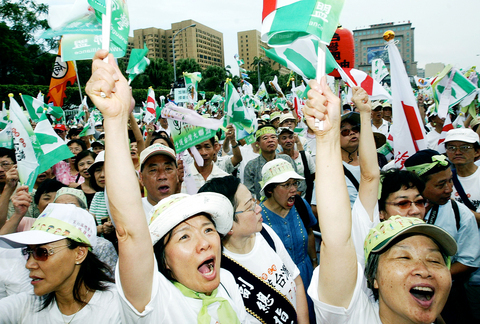Thousands of pro-independence marchers took to the streets in Taipei yesterday afternoon to demonstrate their will to defend the nation, and protest against the pan-blue opposition's ongoing obstruction of the special budget for US arms.
A policeman at the scene estimated the crowd at 20,000, but there was no official count given. Event organizers gave much higher estimates.
The march was organized by the World Federation of Taiwanese Associations and the Hand-in-Hand Taiwan Alliance. Joining them were members of the World United Formosans for Independence, the Taiwan Solidarity Union (TSU), the Democratic Progressive Party (DPP) and social groups.

PHOTO: LIN CHENG-KUN, TAIPEI TIMES
Participants assembled at 2pm at Chiang Kai-shek Memorial Hall and began streaming into the streets at 3pm, marching down Xinyi Road, Hangzhou S Road and Zhongshan S Road. The protesters ended up on Ketagelan Boulevard in front of the Presidential Office, where a succession of speeches was delivered by pro-independence leaders. The march was peaceful and no trouble was reported.
"All participants want to let the world know that Taiwanese hope that their country can possess advanced weapons to resist China and that they are determined to defend themselves. This is why we stand here today," Ng Chiau-tong (黃昭堂), the head of the alliance and chairman of World United Formosans for Independence, told the crowd.
Yesterday's parade was marked by less energy and passion than past pro-independence rallies, and important political figures such as President Chen Shui-bian (
Northern Taiwan Society chairman Wu Shuh-min (吳樹民), the executive chief of the march, suggested recalling opposition lawmakers who have boycotted the arms procurement bill.
"The Legislative Yuan has degenerated into the opposition parties' political arena since the pan-blues lost power in 2000," Wu said. "Bills concerning people's livelihood and welfare have been detained in the legislature, and the arms bill that is crucial to national security did not even obtain the rational discussion it deserves, and was vetoed 29 times because of the pan-blue lawmakers' malicious boycott."
"Such a legislature is worthless and should be recalled, because [opposition lawmakers] don't even know which country is their real motherland," Wu said.
Most of the march participants were pro-independence stalwarts who joined in the 228 Hand-in-Hand rally held last year and the large-scale march against China's "Anti-Secession" Law held on March 26.
A 53-year-old clothing factory owner, who only gave his family name, Lin (
Lin said that although the turnout yesterday seemed rather light, "I think most Taiwanese agreed that we need adequate arms to resist China and protect ourselves."
A 25-year-old man surnamed Chang (
"I support Taiwan's independence and I think Taiwan will be independent in the long run. But first and foremost, Taiwan has to have the power to protect itself," said Chang, who has taken part in pro-independence activities since college.
"Although I don't think every purchase listed in the arms sales bill is necessary, the reality is that the US will not assist in Taiwan's defense if we don't buy them," he said.
Kang, an elementary school teacher who is also 25, said that although yesterday's parade might not sway pan-blue lawmakers, through media reports of the event, the world would know that many Taiwanese are strongly committed to defending Taiwan.

CHAOS: Iranians took to the streets playing celebratory music after reports of Khamenei’s death on Saturday, while mourners also gathered in Tehran yesterday Iranian Supreme Leader Ayatollah Ali Khamenei was killed in a major attack on Iran launched by Israel and the US, throwing the future of the Islamic republic into doubt and raising the risk of regional instability. Iranian state television and the state-run IRNA news agency announced the 86-year-old’s death early yesterday. US President Donald Trump said it gave Iranians their “greatest chance” to “take back” their country. The announcements came after a joint US and Israeli aerial bombardment that targeted Iranian military and governmental sites. Trump said the “heavy and pinpoint bombing” would continue through the week or as long

TRUST: The KMT said it respected the US’ timing and considerations, and hoped it would continue to honor its commitments to helping Taiwan bolster its defenses and deterrence US President Donald Trump is delaying a multibillion-dollar arms sale to Taiwan to ensure his visit to Beijing is successful, a New York Times report said. The weapons sales package has stalled in the US Department of State, the report said, citing US officials it did not identify. The White House has told agencies not to push forward ahead of Trump’s meeting with Chinese President Xi Jinping (習近平), it said. The two last month held a phone call to discuss trade and geopolitical flashpoints ahead of the summit. Xi raised the Taiwan issue and urged the US to handle arms sales to

State-run CPC Corp, Taiwan (CPC, 台灣中油) yesterday said that it had confirmed on Saturday night with its liquefied natural gas (LNG) and crude oil suppliers that shipments are proceeding as scheduled and that domestic supplies remain unaffected. The CPC yesterday announced the gasoline and diesel prices will rise by NT$0.2 and NT$0.4 per liter, respectively, starting Monday, citing Middle East tensions and blizzards in the eastern United States. CPC also iterated it has been reducing the proportion of crude oil imports from the Middle East and diversifying its supply sources in the past few years in response to geopolitical risks, expanding

Pro-democracy media tycoon Jimmy Lai’s (黎智英) fraud conviction and prison sentence were yesterday overturned by a Hong Kong court, in a surprise legal decision that comes soon after Lai was jailed for 20 years on a separate national security charge. Judges Jeremy Poon (潘兆初), Anthea Pang (彭寶琴) and Derek Pang (彭偉昌) said in the judgement that they allowed the appeal from Lai, and another defendant in the case, to proceed, as a lower court judge had “erred.” “The Court of Appeal gave them leave to appeal against their conviction, allowed their appeals, quashed the convictions and set aside the sentences,” the judges